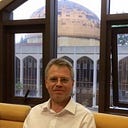Why You Shouldn’t Work Too Hard
There is a drive to be productive at work, in some business sectors more than others — if you aren’t productive what are you even doing here?!
Many of us want to have a productive day, each with our own definition of productivity, unless we only have our bosses’ take on what is productive. Pushing productivity (like a drug!) pushes us out of the way, we are not intended to be productive all the time. I hope this isn’t news to anyone, but the prevalence of toxic working practices, whether our own or imposed on us by work culture, suggests otherwise.
Pushing productivity (like a drug!)
pushes us out of the way.
I thought about this a lot during my project management apprenticeship and had many conversations with colleagues about how we were (just) managing to squeeze everything in. We had to be more efficient and more productive, yes it was work-based training but the work still had to be done. Working for the Church does mean that the Gospel (of Jesus) is central to the work that I do, but there is another gospel, the gospel of productivity, it comes in two versions:
- It urges us to be productive from 9 to 5 as we check our emails on our smartphones while commuting and at the weekend (this isn’t productive by the way).
- It tells us that with sufficient focus we can achieve all we really need to each day in an hour, or even less, see The Four Hour Workweek.
It is in fact this latter message which begins to show us what is wrong with 100% 24/7 productivity. You are not a machine, even if you’re on a production line. The human body has cycles:
- the monthly female hormonal cycle,
- everyone’s biorhythm,
- sugar/energy levels, or
- the sleep cycle.
These all combine in the motivation/stress/boredom/creativity cycle. The human body itself, our productive ‘machine’, is not set up to churn out work all day long, without risk of RSI, headaches, migraine, or musculoskeletal problems …
In short, we must take breaks, we must expect not to be productive all the time. Any work environment which doesn’t recognise and incorporate this is, essentially, inhumane and bullying. Every time you don’t take a break when you ought to, i.e. every hour, you are reducing your productivity and damaging yourself.
If you’re one of those people who doesn’t take a break you can test this for yourself. Force yourself (yes, I chose ‘force’ deliberately) to stop for a few minutes in the middle of the day and tune into how you feel. This might be inconclusive, but you can try it again at the end of the day, do you crash out as soon as you get home, are you snappy with family, do you go to bed as soon as you have had dinner? Or, are you desperately trying to write a portfolio narrative for your project management apprenticeship when you really, really want to switch off? All of these ‘crash’ behaviours that I’ve listed are signs that you are doing too much, or that you are broken.
It’s only work, don’t let it kill you!
It’s time to work smarter, not harder, especially if you’re involved in an apprenticeship as well as your regular work. And take it easy. It’s only work, don’t let it kill you!
Here are my top tips:
- Learn about yourself, and find out when you work best when you are most productive, and when you are most creative.
- Choose the work tasks that fit best with how you are throughout the day.
- Take proper breaks.
- Have a walk at lunchtime.
- Combine work and well-being by having a walking meeting (I learnt about this from another Multiverse Apprentice).
There are various tools and techniques — set a timer on your watch, computer, or smartphone. But don’t chain yourself to your desk and work non-stop from when you arrive to when you leave.
You may have spotted that the secret of real productive work (there is no secret), is to work with yourself first. Don’t work to live, live so that you can work, and do all the other things that form part of your life. Take care of yourself as and when you arrive and leave, as you adjust to the rhythm of the day (e.g. low energy in the mid-afternoon) and to your own physical, mental, and emotional rhythm. And distract your colleagues (usual caveats apply), they’re working too hard as well!
The original version of this blog was published here. Read more about work/life balance here Work and life during a pandemic. Also see work-related partner blogs here Partner blogs.
Julian Bond is Funding Officer for the Methodist Church based in London and has completed the Multiverse Project Management Apprenticeship. He is writing for the Apprentice Lens as part of the Blogging Team. Here’s more about him: he loves writing about all kinds of topics, recently being inspired by a weekly writing challenge on work during the pandemic. He brings a wealth of work experience and concern for people’s well-being together. He has also written various book reviews.
